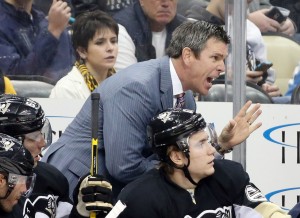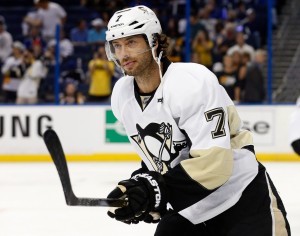As we draw closer to the start of the season, I’ve read and heard more and more pundits favoring the Pittsburgh Penguins as repeat Stanley Cup victors. If the Penguins are going to recapture Stanley Cup glory, here are a few ways they can keep the arrow pointed in the right direction.
Coaching and Intensity

During the Stanley Cup Final, the Penguins made the San Jose Sharks look mismatched. Actually, the term mismatch is a gross understatement. For the majority of the series, the Sharks were exposed and dominated by the speed and skill of the Penguins.
Head coach Mike Sullivan inspires his players to maximize their effort on every shift. This was evident during the entirety of the playoffs and, to a lesser degree, during the waning weeks of the regular season. Yes, having three very realistic scoring lines was helpful. But that was just part of the winning formula. There was a certain “X Factor” the Pens had during their Cup run. The combination of effective coaching, their up-tempo play, and skill beyond that of their competitors proved to be a deadly combination.

Any good head coach in the NHL understands the difference between regular season hockey and playoff hockey, even if they don’t like to admit it. It’s a good idea to embrace those differences early in the season, though.
An 82 game season is no sprint. In the playoffs, there is an end in sight. Win four games, then rest up for the next sprint. Eighty-two games played in the style that the Pens used to win the Cup could risk player fatigue and burnout by midseason.
Adjusting to those differences in play could be as simple as rotating healthy scratches early and often. Coaches don’t like to modify the tempo at which players execute. So rather than pace the speed of the game, keep bodies fresh by giving them adequate downtime between games. After all, the NHL’s schedule is an aggressive one in 2016-17.
Continue Cultivating Youth
The Penguins have had their share of recent failures with high-profile veteran acquisitions – see Jarome Iginla’s time spent playing on his off wing, for example. A lot of the blame for those old tendencies left with the old regime (Dan Bylsma, then-General Manager, Ray Shero). With GM Jim Rutherford and Sullivan now eying younger players to play bigger roles, there’s never been a better time for homegrown talent to shine.
I wrote earlier about playing Derrick Pouliot, but it doesn’t end there. Injuries have delayed the arrival of up-and-coming forwards Scott Wilson and Daniel Sprong. Previously, we’ve seen both in action with the big club, logging meaningful NHL minutes. Make no mistake, those two youngsters will be given opportunities when they return, especially Wilson who signed a one-way deal last season. Check out the clip below for a quick goal that Wilson scored against Detroit during the regular season. It was set up by another rising youngster, Conor Sheary.
Make no mistake, those two youngsters will be given opportunities when they return, especially Wilson who signed a one-way deal last season. Check out the clip below for a quick goal that Wilson scored against Detroit during the regular season. It was set up by another rising youngster, Conor Sheary. And although the re-signing of Matt Cullen delays his path to the big club, Oskar Sundqvist still projects as a useful bottom-six forward at the NHL level.
One of Mike Sullivan’s great defining traits is his patience with younger players. During their Stanley Cup run, Sullivan trusted Bryan Rust, Tomas Kuhnhackl, Conor Sheary and Matt Murray to play key minutes. This was a more than welcome departure from the preference towards veterans, as exhibited by the two former head coaches, Dan Bylsma and Mike Johnston. The young players were hungry, and it showed.
Sam Kasan quoted Mike Sullivan when he was hired as the head coach of the Pittsburgh Penguins:
The only way they’ll maximize their potential is to be challenged. That’s my responsibility. In the absence of that, I don’t think we can reach our potential.
Play to Win Now

Finding the right balance between “playing to win now” and “developing younger players” can be a tough task. On one hand, the Pens have a core group of star players who are in their prime and ready to deliver. On the other hand, there is an intriguing group of younger players who deserve to be evaluated during real NHL competition. This is a delicate juggling act.
There will be times during this season where the Penguins’ lineup might be dominated by those younger players who could be rotating in for a few tired veterans. Balancing the “when” and the “who” will be interesting and, of course, will further help define Sullivan’s preferences and coaching style.
At any rate, the need to win now should be paramount. Let the roster questions sort themselves out. If Derrick Pouliot shows that he is better than Justin Schultz, start him. If Marc-Andre Fleury convincingly outperforms Matt Murray in the early going, then he should be the starting goaltender.
With the Penguins operating as a superstar-heavy team, it is important to avoid a false sense of security by relying too heavily on stars to make-up for developmental shortcomings of the younger players. That’s not to contradict my second point; developing talent is important and should be a big part of the 2016-17 regular season.
For the Penguins to repeat as Cup champions, though, they must win while the core group of superstars remains in their prime and intact. Play the best players, whoever they may be. Hopefully, some of those players happen to be the younger ones who are ready to take the next step forward, and take some of the burdens off of the ageing veterans.